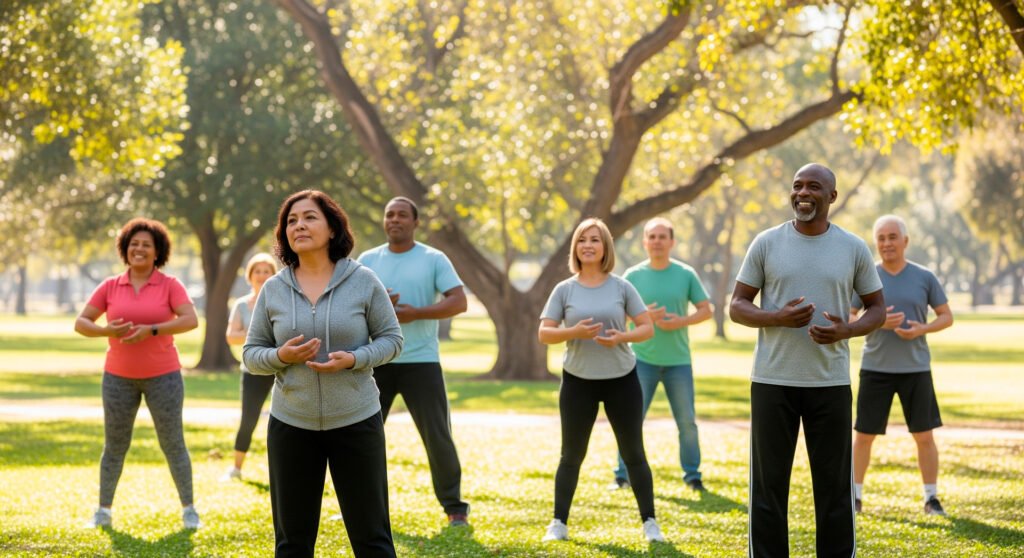Page Contents
ToggleYou’re pushing through another afternoon energy crash, wondering why that third cup of coffee isn’t helping anymore. If you’re tired of feeling tired, you’re not alone. Millions of Americans between 30 and 60 struggle daily with fatigue that seems to have no clear cause, leaving them searching for natural ways to reclaim their vitality.
The good news? Understanding the root causes of your exhaustion and implementing evidence-based natural strategies can help you natural energy boost your way back to feeling like yourself again. Let’s explore what science tells us about why we feel drained and how to fight back naturally.
For many, this feeling of being drained is directly linked to a sluggish metabolism, which can also lead to stubborn weight gain. If you’re looking for a stimulant-free way to support your body’s natural energy expenditure, our in-depth review of AquaSculpt explores a unique thermogenic formula.
Understanding Why You Feel So Tired All the Time
Fatigue isn’t just about feeling sleepy after a long day. It’s a complex experience that affects you physically, mentally, and emotionally. When you’re truly fatigued, you might notice your muscles feel weak, your mind struggles to focus, and your motivation seems to have disappeared entirely.

Several factors could be draining your energy reserves without you realizing it. Your body might be dealing with anemia, where your blood carries less oxygen than it should. Heart disease can make your cardiovascular system work harder, leaving you breathless and tired. An underactive thyroid gland might be slowing down your entire metabolism, making everything feel like an uphill battle.
Sleep disorders are particularly sneaky energy thieves. You might think you’re getting eight hours of rest, but conditions like sleep apnea or insomnia can leave you feeling exhausted despite spending plenty of time in bed. Even medications you’re taking for other health conditions – blood pressure drugs, antidepressants, or antihistamines – might be contributing to your fatigue.
When your metabolism is “inactive” for most of the day, it not only causes fatigue but also stubborn fat retention. To learn about a new approach to help “wake up” your metabolism, our comprehensive analysis of AquaSculpt explains how its ‘ice water hack’ works.
Two Types of Fatigue That Drain Your Energy
Your exhaustion likely falls into one of two categories, and understanding the difference can help you increase energy levels more effectively.
Muscle fatigue is what you experience after physical exertion. Your muscles literally can’t contract as forcefully as they normally would. This is the tired feeling after a workout or a day of physical labor – and it’s actually a sign that your body is adapting and getting stronger.
Central fatigue, also called brain fatigue, is trickier. This affects your ability to concentrate, stay motivated, and feel alert. It’s the type of exhaustion that makes simple tasks feel overwhelming, even when you haven’t done anything physically demanding. Mental health challenges like depression or anxiety can make this type of fatigue worse.
Natural Ways to Fight Fatigue and Boost Energy
The most effective approach to combat fatigue involves addressing lifestyle factors that directly impact your energy production and utilization.

Move Your Body Regularly
Exercise might seem counterintuitive when you’re tired, but it’s one of the most powerful natural energy boosters available. Physical activity increases energy-promoting brain chemicals like dopamine and serotonin – which explains why you feel so good after a workout. You don’t need to become a marathon runner; even 20 minutes of moderate activity three times a week can help sedentary people feel more energized.
If you’re struggling to find the energy to get started, a supplement that supports male vitality and stamina might be a helpful tool. You can learn about one such option in our comprehensive analysis of Pura Boost.
Fuel Your Body Strategically

What you eat directly impacts your energy levels throughout the day. Foods with a low glycemic index – like whole grains, high-fiber vegetables, nuts, and healthy oils – provide steady energy without the crash that comes from simple carbohydrates. Think of it as choosing premium fuel for your body’s engine.
Stable blood sugar from good food choices is key to preventing energy crashes, which often lead to cravings. For those who need extra support managing cravings and supporting their metabolism, our complete breakdown of AquaSculpt examines its blend of natural, metabolism-supporting ingredients.
Master Your Sleep Environment
If you suspect poor sleep is behind your fatigue, try an unconventional approach: sleep restriction. Go to bed later and aim for just four hours of quality sleep initially. If you sleep soundly during those hours, gradually add 15-30 minutes each night. This technique helps you fall asleep faster and achieve deeper rest.
Smart Hydration and Strategic Caffeine Use
Stay Consistently Hydrated
Dehydration is one of the earliest signs your body sends when energy levels start dropping. Men should aim for about 15 cups of fluids daily, while women need around 12 cups. Don’t forget that water-rich foods like cucumbers, citrus fruits, and melons contribute to your daily hydration goals.
Use Caffeine Wisely
Coffee can increase energy levels effectively, but timing matters. Limit caffeine intake after 2 PM to avoid sleep disruption, and stick to one or two cups to prevent the jittery crashes that come with overconsumption. Energy drinks might seem appealing, but they’re often loaded with sugar and additives that can leave you feeling worse later.
Managing Stress and Emotional Energy Drains
Chronic stress is an enormous energy drain that many people underestimate. Stress-induced emotions literally consume massive amounts of physical and mental energy, leaving you feeling depleted even when you haven’t been physically active.

Consider incorporating stress-reduction techniques like meditation, yoga, or tai chi into your routine. Sometimes simply talking with a trusted friend or joining a support group can help diffuse the stress response that’s quietly draining your energy reserves.
Don’t underestimate the power of saying no, either. Overcommitting to professional, family, and social obligations is a common cause of persistent fatigue. Streamlining your must-do activities and asking for help when you need it isn’t selfish – it’s essential for maintaining your energy levels.
When to Seek Professional Help
While natural approaches can be incredibly effective, some types of fatigue require medical attention. If you’ve tried lifestyle changes for several weeks without improvement, or if your fatigue is accompanied by other concerning symptoms, it’s time to consult with a healthcare provider.
Conditions like chronic fatigue syndrome, hormonal imbalances, or underlying medical issues need proper diagnosis and treatment. A healthcare professional can also review your medications to see if any might be contributing to your energy problems.
For men, a hormonal imbalance can often be the root cause of persistent fatigue and low libido. To learn about a new approach to male wellness, our complete breakdown of Pura Boost examines its unique formula.
Your Path to Natural Energy Recovery
Reclaiming your energy doesn’t have to involve expensive supplements or complicated protocols. The most effective strategies are often the simplest: moving your body regularly, eating foods that provide steady fuel, managing stress, and ensuring quality sleep.
Start with one or two changes that feel most manageable for your current lifestyle. Maybe that’s taking a 10-minute walk after lunch, switching to whole grain bread, or establishing a consistent bedtime routine. Small, consistent changes often lead to the most dramatic improvements in energy levels.
Still, if you’re struggling with chronic fatigue or low vitality, Mitolyn is a mitochondrial support formula that could help you feel naturally energized again.
Remember, your energy is precious, and you deserve to feel vibrant and engaged in your daily life. With patience and the right natural approaches, you can move from surviving your days to truly thriving in them.
If low energy still lingers despite healthy habits, Mitolyn may be the missing piece in restoring your energy from within.
Sources
This article was inspired by and adapted to better serve the readers of Best Natural Health Products from “Boosting Energy & Managing Fatigue”. Harvard Health Publishing. Available at: https://www.health.harvard.edu/topics/energy-and-fatigue. Accessed on: June 17, 2025.
Mark Henderson is the Lead Product Analyst and resident skeptic. He specializes in the "Dosage Audit," rigorously cross-referencing label claims against clinical trials to expose underdosed products. Mark helps readers bypass the hype to find longevity solutions with a proven ROI.
- Mark Henderson
